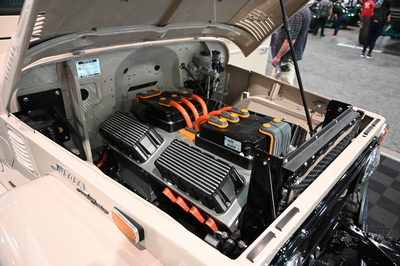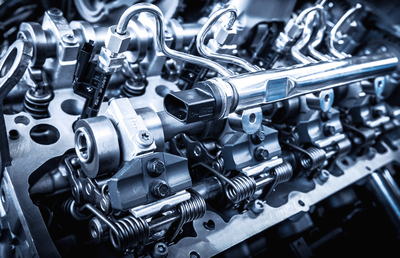LEGISLATIVE AND TECHNICAL AFFAIRS
Law & Order
By Christian Robinson
 California—Aftermarket ZEV Conversion: California Senator Anthony Portantino introduced SEMA-sponsored legislation to create a financial rebate program for converting gas- and diesel-powered motor vehicles into zero-emissions vehicles (ZEVs). If enacted, the bill will offer Californians up to $2,000 for converting their car or truck into a ZEV. Currently, the state’s existing rebate program offers $1,000–$4,500 toward the purchase of a new vehicles, but none assist with ZEV conversions of gas-powered vehicles that started their life with an internal-combustion engine.
California—Aftermarket ZEV Conversion: California Senator Anthony Portantino introduced SEMA-sponsored legislation to create a financial rebate program for converting gas- and diesel-powered motor vehicles into zero-emissions vehicles (ZEVs). If enacted, the bill will offer Californians up to $2,000 for converting their car or truck into a ZEV. Currently, the state’s existing rebate program offers $1,000–$4,500 toward the purchase of a new vehicles, but none assist with ZEV conversions of gas-powered vehicles that started their life with an internal-combustion engine.
SEMA opposes the government choosing winners and losers in the marketplace, including California’s 2035 ban on new gas- and diesel-powered cars and trucks. SEMA remains committed to protecting the automotive community’s rich heritage while also embracing innovations with emerging technologies.
STATE UPDATE
California Oceano Dunes: The California Coastal Commission is seeking to abolish all off-road access to the Oceano Dunes State Vehicular Recreation Area (SVRA) by 2024, claiming environmental damage by motorized recreation. SEMA has joined with EcoLogic Partners—a legal collaboration between the Off-Road Business Association
(ORBA), American Sand Association, and American Motorcyclist Association District 37—to challenge the Commission’s decision. The California Superior Court for San Luis Obispo County has scheduled a June 15 hearing on the lawsuit, which contends that the Commission lacks authority to terminate OHV use and failed to present evidence regarding environmental harm.
For more than 100 years, recreationists have enjoyed driving their motorized vehicles along the Pacific coastline near Pismo State Beach. Oceano Dunes is the state’s only oceanside OHV park and it has been managed since 1974 by the California Department of Parks and Recreation. The lawsuit notes that the California Coastal Commission did not come into existence until later and that it has never had authority to manage the park, let alone shut down OHV use.
Connecticut—License Plates: The Connecticut Senate introduced SEMA-supported legislation to allow the display of only a single, rear-mounted license plate for all passenger vehicles. If enacted, the bill would protect the aesthetic contours of collector cars and prevent vehicle owners from having to drill mounting holes in bumpers.
Connecticut—Composite Vehicles: Connecticut has introduced SEMA-supported legislation that will allow composite vehicles to be registered as an “antique, rare or special-interest” vehicle. Composite vehicles are defined as any motor vehicle assembled from parts of other motor vehicles or which has been modified as not to resemble another motor vehicle. By being allowed to register as antique, rare, or special-interest vehicles, composite vehicles, such as replica cars, may display license plates reflective of the time they represent.
Hawaii—Special-Interest Vehicles: Hawaii has introduced SEMA-supported legislation to allow the titling and registration of special-interest vehicles that are at least 35 years old or modified to resemble a vehicle that is at least 35 years old. Currently, the term “special-interest vehicles” includes street-rod and street-rod replica vehicles, which were manufactured before ’68 or manufactured after ’67 to resemble a vehicle manufactured before ’68. The bill amends these definitions to be based on the age of the vehicle or the parts used, rather than a certain year. Such vehicles would be required to meet the safety standards that were in effect at the time of manufacture.
Maryland—Exhaust Noise: Maryland has introduced SEMA-supported legislation to reform the state’s existing exhaust noise laws. If passed, the bill will set an upper limit for vehicle noise based on SEMA’s model legislation (95 decibels) and make grant money available to local police departments to purchase sound measuring equipment to objectively determine whether a car or truck is too loud. Maryland’s current law prohibits vehicle modifications that make the vehicle louder than its original stock configuration and provides no standard on which to determine compliance.
Maryland—Military Vehicles: Lawmakers in Maryland introduced a version of SEMA’s military vehicle model bill which will allow owners to register and operate former military vehicles on public roads. If passed, the bill will allow such vehicles to be used for occasional transportation, exhibitions, veterans’ events, club activities, parades, tours and similar uses.
Minnesota—ZEV Mandate: Minnesota lawmakers have introduced SEMA-supported legislation to prevent the state from adopting California’s new motor vehicle emission standards. Under current law, sales of new gas- and diesel-powered vehicles may be banned starting in 2035 if the existing ties to California’s policy remain in place. Democrats currently maintain control of the state legislature and governor’s mansion, making enactment of such legislation a challenge. However, Governor Tim Waltz has indicated that Minnesota will not blindly follow California’s ban.
Nebraska—License Plates: The Nebraska legislature introduced SEMA-supported legislation to allow the display of only a single, rear-mounted license plate for all passenger vehicles. If enacted, the bill would protect the aesthetic contours of collector cars and prevent vehicle owners from having to drill mounting holes in bumpers.
New Mexico—License Plates: Lawmakers in New Mexico introduced SEMA-opposed legislation to require the display of both a front and rear-mounted license plate for all passenger vehicles. The state currently only requires a rear plate to be displayed.
Tennessee—Exhaust Noise: Tennessee lawmakers introduced SEMA-opposed legislation that states it is unlawful to operate a motor vehicle that produces excessive or unusual noise or annoying smoke. The bill would not implement a fair testing procedure and decibel limit for vehicle owners accused of unreasonable exhaust noise violations.
Vermont—Exhaust Noise: Lawmakers in Vermont have introduced SEMA-supported legislation to reform the state’s existing exhaust noise laws. The bill, which includes elements of SEMA’s model legislation, would implement a fair and objective method for determining compliance with the law.
FEDERAL UPDATE
REPAIR Act Reintroduced in U.S. House of Representatives: U.S. Representative Neal Dunn (R-FL) has introduced the “Right to Equitable and Professional Auto Industry Repair (REPAIR) Act,” H.R. 906, as the result of the efforts of SEMA, MEMA Aftermarket Suppliers, the Auto Care Association, and the CAR Coalition. The REPAIR Act seeks to protect consumers’ rights to decide where and with what parts to repair and maintain their vehicles.
New barriers to working on your own vehicle, independent automotive repair, and manufacturing replacement parts are emerging as vehicle technology evolves. While many aftermarket businesses and automotive enthusiasts rely on access to diagnostic data through the OBD-II port, they also need access to telematic data and information that is wirelessly transmitted directly to vehicle manufacturers. The REPAIR Act ensures that vehicle owners and repair businesses have access to this information, which is critical to maintaining a competitive repair market.
Below are key provisions of the REPAIR Act:
- Prohibits manufacturers from imposing technological or legal barriers that block aftermarket replacement part manufacturers from accessing critical information and tools necessary to develop interoperable products with emerging vehicle technology.
- Establishes the right for replacement part manufacturers and independent repair shops to access critical information, tools, and equipment needed to maintain vehicles.
- Requires companies producing vehicles equipped with telematics to make any critical repair information and tools available to replacement part manufacturers and repair facilities at a fair and reasonable cost.
- Provides vehicle owners with data and information wirelessly generated by their vehicles.
- Establishes a right for vehicle owners to securely share their vehicle’s repair and maintenance data with their repairer of choice.
SEMA is also committed to protecting the right to modify vehicles by prohibiting automakers from locking down ECUs and ensuring aftermarket companies have access to the information needed to recalibrate vehicles with Advanced Driver Assistance Systems after they have been modified. There is more work to be done on behalf of the aftermarket industry; stay tuned for additional information on this front.
 Maryland—ZEV Mandate: Lawmakers in Maryland, including State Automotive Enthusiast Leadership Caucus Chair Delegate Kevin Hornberger, have introduced SEMA-supported legislation which would prevent the state from adopting California’s 2035 ban on the sale of new gas- and diesel-powered cars and trucks unless certain conditions are met. If approved, the bill would require the state to study the economic impact of such a ban on consumers and small businesses, as well as the electrical grid, and require authorization from the legislature to move forward. Democrats currently control the legislature by large margins, making passage an uphill battle.
Maryland—ZEV Mandate: Lawmakers in Maryland, including State Automotive Enthusiast Leadership Caucus Chair Delegate Kevin Hornberger, have introduced SEMA-supported legislation which would prevent the state from adopting California’s 2035 ban on the sale of new gas- and diesel-powered cars and trucks unless certain conditions are met. If approved, the bill would require the state to study the economic impact of such a ban on consumers and small businesses, as well as the electrical grid, and require authorization from the legislature to move forward. Democrats currently control the legislature by large margins, making passage an uphill battle.






